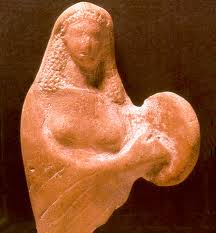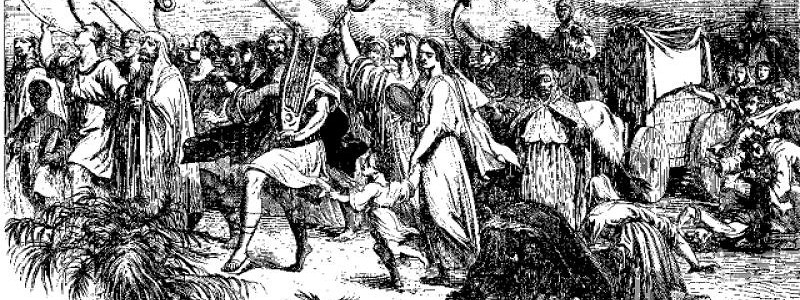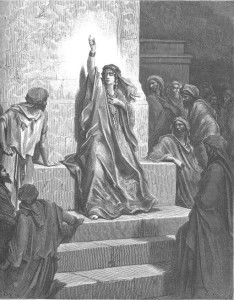Nephi once observed that ancient Hebrew prophets (Isaiah in particular) spoke things which were hard to understand because his people did “know not concerning the manner of prophesying among the Jews” (2nd Nephi 25:1). Among the Latter-day Saints, I’ve felt this was often the case as well, with several fascinating characteristics of Hebrew Bible prophetic discourse, and several characteristics of the Hebrew prophets themselves, being ignored or misunderstood in our theology and practice. Over the course of several posts I’d like to discuss these characteristics, with today’s post being a preview of coming attractions.
 First, many Old Testament prophets had a dangerous sense of humor, and were not afraid to use it. While it is often thought that the Romans invented satire, a strong case has been made that Hebrew prophets (both the former and the latter prophets) developed similar techniques to critique their society and were themselves proto-satirists (see Thomas Jemielity, Satire and the Hebrew Prophets, Westminster, 1992). One need only consider Elijah’s ridicule of his main competition, the prophets of Baal, to get a sense of this:
First, many Old Testament prophets had a dangerous sense of humor, and were not afraid to use it. While it is often thought that the Romans invented satire, a strong case has been made that Hebrew prophets (both the former and the latter prophets) developed similar techniques to critique their society and were themselves proto-satirists (see Thomas Jemielity, Satire and the Hebrew Prophets, Westminster, 1992). One need only consider Elijah’s ridicule of his main competition, the prophets of Baal, to get a sense of this:
27 When noon came, Elijah mocked them, saying, “Shout louder! After all, he [Baal] is a god. But he may be in conversation, he may be detained, or he may be on a journey [the Hebrew here is unclear–possibly meaning that Baal has gone to relieve himself], or perhaps he is asleep and will wake up.” (1st Kings 18:27, JPS translation)
;
Second, the Hebrew Bible sometimes makes light of some prophets, or, at least uses some prophets as satirical figures. The Book of Jonah, for instance, long accepted or disputed as history, is likely best understood as a non-historical satire about Jonah that critiques, in part, the xenophobia of his people. While I want to explore Jonah in a separate post, you can get a sense of the argument from this summary I wrote a few years ago here when writing for the blog By Common Consent.
Third, many ancient Israelite prophets were women. Huldah (2nd Kings 22:14), Miriam (Ex 15:20), Deborah (Judg 4:4) and Noadiah (Neh 6:14) are specifically named female prophets, and, when mentioned, they are never described as exceptions to the rule, indicating that they were commonplace. Joel even prophesied about male and female prophets living in the future, reminding us that women being included among the prophets is not something that is to be limited to the past:
28And afterward, I will pour out my Spirit on all people.
Your sons and daughters will prophesy, your old men will dream dreams, your young men will see visions.
29 Even on my servants, both men and women, I will pour out my Spirit in those days. (Joel 2: 28-29, NIV translation)
Fourth, Old Testament prophets were rarely boring people. Some of the earlier prophets had ecstatic experiences, dancing and playing music like whirling dervishes as a part of their delivery of oracles for God (see for instance The Anchor Bible Dictionary entry for “Prophecy” in Vol. 5, p. 493). Saul himself developed a reputation as an associate of this school of prophets (see 1 Sam. 10: 5-13; and 1 Sam 19: 19-24), and David’s wild dancing before the ark seems related to these spirited activities (2 Sam 6: 12-15). Later prophets, while possibly having such ecstatic experiences as well, are better known for re-enacting dramatic presentations of their message to the public, such as bringing mock-trial lawsuits on behalf of God against Israel, or engaging in other even more unusual public “performance art” acts of prophecy on behalf of the Lord.
 While I would love to see a “restoration” of these components of ancient Israelite prophecy among the Mormons today, we certainly can’t expect it any time soon, although I’d like to think they might be included in President Uchtdorf’s recent sermon suggesting exciting things yet to come, or that perhaps the musical “The Book of Mormon” somehow qualifies by the insertion of LDS church advertisements in its Playbill. The best-known official prophetic voice in this last dispensation to try anything like restoring Old Testament prophetic humor was J. Golden Kimball, and he did it well, but our satirical Urim and Thummim died with him and we are left like Saul, trying to conjure up the ghost of J. Golden stories to give us some salty or sarcastic prophetic advice today.
While I would love to see a “restoration” of these components of ancient Israelite prophecy among the Mormons today, we certainly can’t expect it any time soon, although I’d like to think they might be included in President Uchtdorf’s recent sermon suggesting exciting things yet to come, or that perhaps the musical “The Book of Mormon” somehow qualifies by the insertion of LDS church advertisements in its Playbill. The best-known official prophetic voice in this last dispensation to try anything like restoring Old Testament prophetic humor was J. Golden Kimball, and he did it well, but our satirical Urim and Thummim died with him and we are left like Saul, trying to conjure up the ghost of J. Golden stories to give us some salty or sarcastic prophetic advice today.

